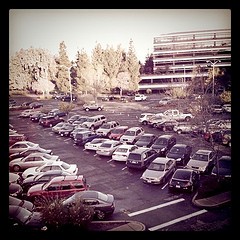 Oregon could become the next state to pave the way for peer-to-peer car sharing companies, which allow people to rent out their personal vehicles when they’re not using them (which is usually more than 90 percent of the time). It’s a common sense and entrepreneurial idea that we’ve championed here at Sightline for a long time.
Oregon could become the next state to pave the way for peer-to-peer car sharing companies, which allow people to rent out their personal vehicles when they’re not using them (which is usually more than 90 percent of the time). It’s a common sense and entrepreneurial idea that we’ve championed here at Sightline for a long time.
Here’s how it works: Let’s say you need to rent a car for a couple of hours to go pick up an unwieldy piece of furniture, or even for a weekend beach trip. Instead of calling a rental car company and schlepping to their office, you go online and find a network of personal cars available to rent throughout the city. You find one that’s owned by someone who lives a few streets from you, walk over, and use your mobile phone to unlock it. For the car owner, sharing a car for 15 hours week can earn $350 a month.
But sticky insurance questions have historically prevented people from wholeheartedly embracing the concept. Insurers don’t want to be liable for dozens of different drivers, and car owners had few assurances that their insurance companies wouldn’t drop their policies if they participated in personal car sharing programs. That is, until last year, when California unanimously passed legislation that clarified all those lines of responsibility and made everyone happy.
Now Oregon is following suit with HB3149, sponsored by Rep. Ben Cannon, which has a hearing this Friday before the House Transportation and Economic Development Committee. Like the California bill, it gives both insurers and car owners the protections they need to make personal sharing viable. Since the California bill went into effect last month, three different startups are now offering peer-to-peer carsharing services in the state.
At least one of them—Getaround—thinks Oregon would be a great place to expand. The company launched in San Francisco late last year, allowing car owners and would-be renters to connect via Facebook. Owners can post an hourly rate for their car, and then they’re contacted by would-be renters whose driving records have been screened by the company. And while the car is being used in the network, Getaround’s insurance is liable for accidents or damages.
For states to attract companies like Getaround, they need to pass uncontroversial legislation modeled on California’s. Here’s how Cannon aide Christy Splitt put it:
What this bill is about is bringing new business that helps Oregonians recoup the costs of car ownership at a time when they might not be using one that much and when it might be a good idea to get some extra money in their pockets. Our intent is to bring a business here so Oregonians can use a service that we think is a great idea and that people in Portland would be particularly interested in.
If California is any example, approving HB3149 should be a no-brainer. (Since when does anything there pass unanimously?) It has virtually no opposition and lots of benefits. It lets people make money from an expensive investment that sits idle most of the time, gets dollars flowing through the local economy, and makes a car-free lifestyle a little more convenient.
So I have two words for Oregon legislators: Why not?
Full parking lot photo courtesy of flickr user Steve Paulo via a Creative Commons license.
